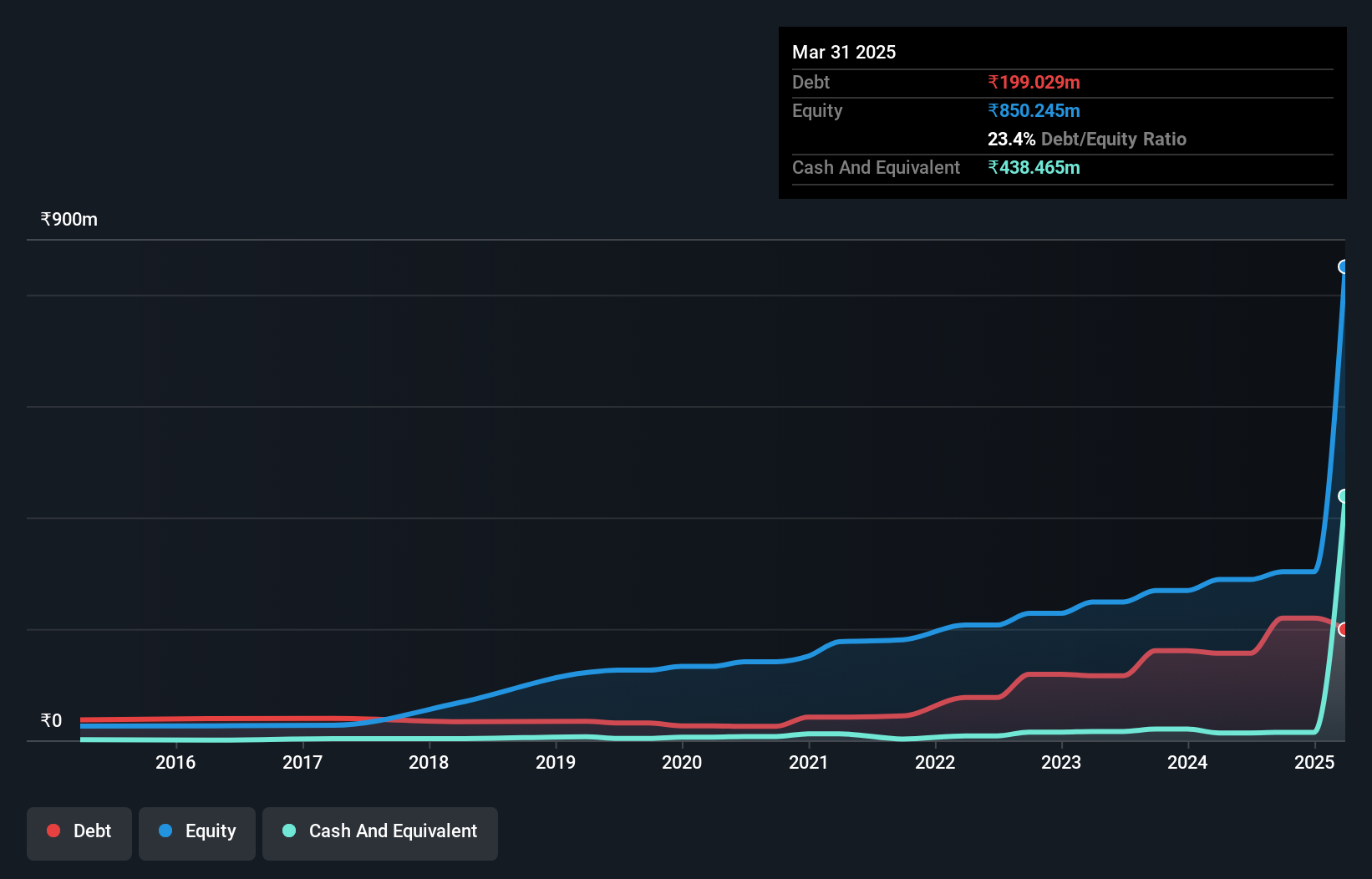- India
- /
- Consumer Durables
- /
- NSEI:AVROIND
Here's Why Avro India (NSE:AVROIND) Has A Meaningful Debt Burden
David Iben put it well when he said, 'Volatility is not a risk we care about. What we care about is avoiding the permanent loss of capital.' So it seems the smart money knows that debt - which is usually involved in bankruptcies - is a very important factor, when you assess how risky a company is. We note that Avro India Limited (NSE:AVROIND) does have debt on its balance sheet. But the real question is whether this debt is making the company risky.
What Risk Does Debt Bring?
Debt and other liabilities become risky for a business when it cannot easily fulfill those obligations, either with free cash flow or by raising capital at an attractive price. In the worst case scenario, a company can go bankrupt if it cannot pay its creditors. However, a more frequent (but still costly) occurrence is where a company must issue shares at bargain-basement prices, permanently diluting shareholders, just to shore up its balance sheet. Of course, debt can be an important tool in businesses, particularly capital heavy businesses. When we examine debt levels, we first consider both cash and debt levels, together.
What Is Avro India's Debt?
As you can see below, at the end of March 2025, Avro India had ₹199.0m of debt, up from ₹156.2m a year ago. Click the image for more detail. But on the other hand it also has ₹438.5m in cash, leading to a ₹239.4m net cash position.

A Look At Avro India's Liabilities
According to the last reported balance sheet, Avro India had liabilities of ₹264.9m due within 12 months, and liabilities of ₹59.1m due beyond 12 months. On the other hand, it had cash of ₹438.5m and ₹235.1m worth of receivables due within a year. So it actually has ₹349.5m more liquid assets than total liabilities.
This surplus suggests that Avro India has a conservative balance sheet, and could probably eliminate its debt without much difficulty. Simply put, the fact that Avro India has more cash than debt is arguably a good indication that it can manage its debt safely.
View our latest analysis for Avro India
The bad news is that Avro India saw its EBIT decline by 13% over the last year. If earnings continue to decline at that rate then handling the debt will be more difficult than taking three children under 5 to a fancy pants restaurant. There's no doubt that we learn most about debt from the balance sheet. But it is Avro India's earnings that will influence how the balance sheet holds up in the future. So when considering debt, it's definitely worth looking at the earnings trend. Click here for an interactive snapshot.
But our final consideration is also important, because a company cannot pay debt with paper profits; it needs cold hard cash. While Avro India has net cash on its balance sheet, it's still worth taking a look at its ability to convert earnings before interest and tax (EBIT) to free cash flow, to help us understand how quickly it is building (or eroding) that cash balance. During the last three years, Avro India burned a lot of cash. While that may be a result of expenditure for growth, it does make the debt far more risky.
Summing Up
While we empathize with investors who find debt concerning, you should keep in mind that Avro India has net cash of ₹239.4m, as well as more liquid assets than liabilities. So although we see some areas for improvement, we're not too worried about Avro India's balance sheet. There's no doubt that we learn most about debt from the balance sheet. However, not all investment risk resides within the balance sheet - far from it. Be aware that Avro India is showing 3 warning signs in our investment analysis , and 2 of those shouldn't be ignored...
Of course, if you're the type of investor who prefers buying stocks without the burden of debt, then don't hesitate to discover our exclusive list of net cash growth stocks, today.
New: Manage All Your Stock Portfolios in One Place
We've created the ultimate portfolio companion for stock investors, and it's free.
• Connect an unlimited number of Portfolios and see your total in one currency
• Be alerted to new Warning Signs or Risks via email or mobile
• Track the Fair Value of your stocks
Have feedback on this article? Concerned about the content? Get in touch with us directly. Alternatively, email editorial-team (at) simplywallst.com.
This article by Simply Wall St is general in nature. We provide commentary based on historical data and analyst forecasts only using an unbiased methodology and our articles are not intended to be financial advice. It does not constitute a recommendation to buy or sell any stock, and does not take account of your objectives, or your financial situation. We aim to bring you long-term focused analysis driven by fundamental data. Note that our analysis may not factor in the latest price-sensitive company announcements or qualitative material. Simply Wall St has no position in any stocks mentioned.
About NSEI:AVROIND
Avro India
Engages in the manufacture and sale of plastic molded furniture and granules in India.
Adequate balance sheet with acceptable track record.
Similar Companies
Market Insights
Community Narratives



